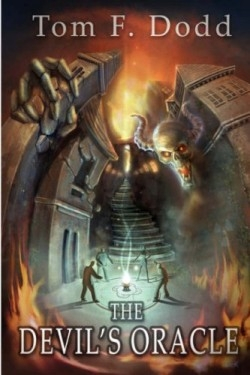The Devil's Oracle
Beware the bewitching book cover. That’s just one of the lessons of The Devil’s Oracle Tom F. Dodd’s deeply engrossing and often genuinely terrifying murder-mystery. The cover suggests monsters sorcery and catacombs—and indeed there are monsters sorcery and catacombs. But in this case the monsters are Muslim-extremist terrorists bent on detonating a dirty bomb in Geneva Switzerland; the sorcery is an allusion to the alchemical processes by which the 16th century seer Nostradamus is said to have witnessed the future; and the catacombs are the lair of a secret supranational group trying to prevent that bomb from destabilizing the international monetary system.
More than a single dollop of patience will be needed as Dodd methodically interweaves all the seemingly disparate elements of his thriller which unfortunately one can easily imagine taking place in real life. First there is Paul a no-nonsense police detective who possesses the ability to ferret out key clues and equally important successfully deduce their implications. There is also Paul’s loving and dedicated wife Valerie who possesses any number of important instincts of her own making her the story’s unsung hero. There is art historian Germain who is asked to decipher and translate a puzzling set of drawings and papers left by an older man whose tragic death in a car crash constitutes the initiating action of the book. Later on and together with his insightful wife Hilde Germain will be central to a plot to spy on the mastermind of the dirty bomb slowly making its way from the Middle East to a nondescript Geneva construction site.
Various foot soldiers in this tale derived from the war on terror pass in and out of the narrative adding color and flavor: ordinary cops and detectives sacrificing life and limb to protect innocent Swiss civilians; next-door neighbors claiming to know how the old man replicated Nostradamus’ experiments; the beautiful Samoyed dog whose appearance in the book—and brush with death—is what finally allows the reader to put all the pieces together.
The early scene focusing on the old man’s death in an accident is very Alfred Hitchcock: the weirdly scribbled pencil notes and inexplicably linked sets of papers are the classic definition of a McGuffin. But it is also one of the reasons why the sprawling plot tendrils that crop up again and again in the story—like the Turkish brute hired to assassinate Paul; like the supranational group leader trying to halt the bomb’s detonation—never confuses the reader. Thankfully there is a fair amount of humor in the novel too and plenty of the requisite sex and romance one might expect. It is interesting that when Dodd introduces a new character—a brilliant and breathtaking beautiful woman assigned to serve as Paul’s deputy—the subplot doesn’t go where you think it’s going to go. The fate of this woman it turns out is going to be bound up very closely with the fate of the city of Geneva and in both cases you can’t wait to find out how it ends.
Reviewed by
Leonard Jacobs
Disclosure: This article is not an endorsement, but a review. The publisher of this book provided free copies of the book and paid a small fee to have their book reviewed by a professional reviewer. Foreword Reviews and Clarion Reviews make no guarantee that the publisher will receive a positive review. Foreword Magazine, Inc. is disclosing this in accordance with the Federal Trade Commission’s 16 CFR, Part 255.

